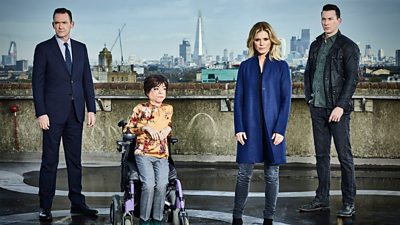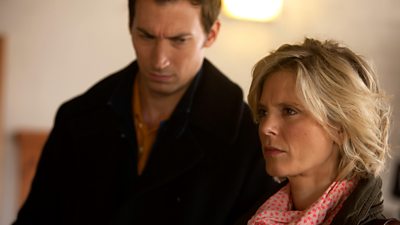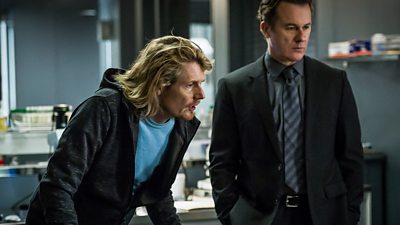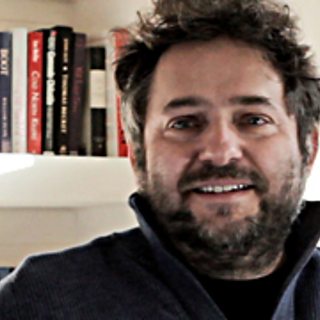Editor's Note: returned to ����ý One for its 21st series this month. wrote the first two episodes of this series Moment of Surrender (catch up on ����ý iPlayer). We asked him about his journey to writing Crime Drama, which has also included , , and .

Can you describe your writing journey? Is it something that you always wanted to do? How did you get your first break?
I left university with the ambition of becoming a director and naturally assumed working as a runner would somehow get me there. Then a kindly told me I was wasting my time and the best two routes to directing were through writing or cinematography. As I had an English degree, writing felt like the better route so I enrolled in a screenwriting course at Birkbeck, devoured all -type books I could get my hands on and watched about a hundred times while living on the dole in Kilburn. Eventually all that led to work writing script reports for a production company, Portobello Pictures, who were then making Dalziel and Pascoe for the ����ý. I began to contribute a few rewrites here and there and finally got to write an episode of my own.
Are there particular books, films, TV programmes etc that inspired you to write when you were growing up and that have stayed with you? Do you have any writing idols?
I grew up with virtually no interest in TV but a huge passion for movies in general and the great post-Watergate 1970s thrillers in particular. So films like , , , and, above all, Chinatown, were big inspirations. Like a lot of scriptwriters, was and remains my greatest writing idol even if did write the end of Chinatown!

You have made a speciality of writing crime and crime procedural drama – what appeals to you about this genre? Is it a good ‘fit’ for you?
There’s an old saying “write what you know” and while there’s some value in that, unless you’re a heart surgeon or you recently left the SAS that might not be enough. The next best thing is to write about something you personally find fascinating – the well has to be deep – and in my case that meant drawing on a lifelong fascination with true crime, dating back to the arrest of the Yorkshire Ripper when I was ten!
Why do you think we (the audience) are so fascinated by procedural drama?
It’s the factor. Everyone knew what the outcome of that novel (and later film) would be – De Gaulle wasn’t killed by an assassin’s bullet so, logically, the book should fail because you know the ending and conventional suspense is therefore impossible. And yet it’s one of the most riveting thrillers ever written because Forsyth shines a light on such a compelling, exotic, closed-off world – the working life of an international assassin. There are whole pages on how one acquires a passport in a false name etc. that hold the reader because we sense the writer has done his research and we want to see and learn how it’s done. In turn all that rich detail is welded to a paradoxically simple overriding dramatic question: ‘Is he going to succeed in killing De Gaulle or not?’

Much of your work features the dark side of human nature including fictionalised portrayals of real events (eg ) – what risks and responsibilities are connected to this?
Without getting into detail about any one specific real-life-inspired drama, I think the risks are obvious – you don’t want to cause offence or pain to people who have already suffered a great deal. The only way to navigate that huge pitfall is to make contact with, for example, surviving relatives of a murder victim as early as possible in the process of bringing the events to the screen. You have to explain why you’re doing what you’re doing, reassure them you have no interest in sensationalizing the crime and hopefully bring them on side. Sometimes that’s possible and sometimes it isn’t.
Can you describe the experience of working on CSI? What was different or surprising about the US way of working?
CSI is the product of a large writers’ room. Once the basic story is agreed, it’s then broken down on whiteboards over three or four days which yields a pretty detailed outline. Then you get to do a couple of drafts of the script before the showrunner or deputy showrunner does a pass to ensure the tone is consistent across all the episodes. Probably what surprised me most was the extent to which the forensics governs everything – if the forensics aren’t fresh or interesting, it doesn’t make it into the show. Fortunately CSI has real life forensic experts working full time on the show, some of whom are fully-fledged writers themselves.
is one of the ����ý’s most successful and enduring drama strands – what challenges does this present to the writer? How do you keep it fresh?
I think the two hour running time of Silent Witness – longer than many feature films – is both a challenge and an inspiration. A challenge because you must find a story that naturally has a large forensics and pathology component and an inspiration because you can tell big, dramatically weighty stories in very different worlds from week to week. There’s really nowhere you can’t go.
If you could create and write any drama what would it be?
Adapting Jake Arnott’s He Kills Coppers left me with a fascination for the history of the Metropolitan police in the sixties and seventies. If you want to take the pulse of a society, take the pulse of those we elect to protect it. Corruption was rife in the Met until the mid-seventies and I would love to tell the epic story of the few brave officers (some from provincial constabularies) who instigated what must have seemed like an impossible sea-change in the face of every kind of intimidation. A British , I guess.
What would be your three key pieces of advice to a new writer?
Don’t worry about breaking into the industry – worry about writing the best spec script you possibly can. If you’ve got a great script and you strike the right balance between courtesy and persistence, someone in a position to help you will eventually read it.
As above, write what you love, whatever that may be, and then just become your own tutor. I learned more from watching Chinatown repeatedly than I did from any screenwriting courses or how-to-write-a-hit-movie-in-2-days books. If romantic comedy is your genre, watch or until you’ve worn the DVD through.
Don’t give up – or at least don’t give up too soon. You might not get anywhere until you’re well into your thirties but stick at it and avoid getting a job that’s so tiring or all-consuming you have no energy left to write.
(this interview was first published in December 2014)
